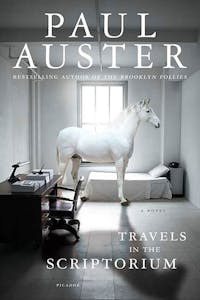Travels in the Scriptorium
A Novel
 Download image
Download image
ISBN10: 0312426291
ISBN13: 9780312426293
Trade Paperback
160 Pages
$15.00
CA$20.25
Longlisted for the International IMPAC Dublin Literary Award
An old man awakens, disoriented, in an unfamiliar chamber. With no memory of who he is or how he has arrived there, he pores over the relics on the desk, examining the circumstances of his confinement and searching his own hazy mind for clues.
Determining that he is locked in, the man—identified only as Mr. Blank—begins reading a manuscript he finds on the desk, the story of another prisoner, set in an alternate world the man doesn't recognize. Nevertheless, the pages seem to have been left for him, along with a haunting set of photographs. As the day passes, various characters call on the man in his cell—vaguely familiar people, some who seem to resent him for crimes he can't remember—and each brings frustrating hints of his identity and his past. All the while an overhead camera clicks and clicks, recording his movements, and a microphone records every sound in the room. Someone is watching.
Both chilling and poignant, Travels in the Scriptorium is vintage Auster: mysterious texts, fluid identities, a hidden past, and, somewhere, an obscure tormentor. And yet, as we discover during one day in the life of Mr. Blank, his world is not so different from our own.
Reviews
Praise for Travels in the Scriptorium
"Auster is one of our most intellectually elegant writers. He has persistently subverted the ordinary mechanisms of suspense, chronology, even genre. In certain fundamental attributes, this new novel resembles his Oracle Night, published in 2003. Yet determined readers come to savor the inimitable way Auster keeps restructuring and vivifying his novelistic obsessions. Themes are hungry ghosts, Borges said. Fortunately, Auster's ghosts are insatiable."—Howard Norman, The Washington Post
"Auster, a literary descendent of Kafka and Borges, is fascinated by the very act of storytelling. Consequently, his novels always involve some form of doubling as one story coils within another. In the wake of The Brooklyn Follies (2006), an expansive novel, Auster presents a spare, metaphysical fable. Mr. Blank, Auster's protagonist, is confined to an austere room, uncertain of his status or the room's location. Names carry great weight in Auster's uncanny fiction, and so it figures that Mr. Blank has lost his memory. His keepers have provided him with a stack of photographs of people who seem dimly familiar and with a typescript written by another prisoner in another time and place. As Mr. Blank reads this compelling account of violence and loss in the Confederation, a land that vaguely resembles nineteenth-century America during the genocidal assault against indigenous peoples, various visitors arrive, claiming to be Blank's victims. But what are his crimes? Auster fans will recognize a parade of characters from earlier works, reaching back to his famed New York Trilogy (1985-86), In the Country of Last Things (1987), and Leviathan (1992), as Auster coyly celebrates the power of the imagination and marvels over the labyrinthine nature of the mind in an archly playful and shrewdly philosophical tribute to the transcendence of stories."—Donna Seaman, Booklist
"On the centennial year of Samuel Beckett's birth, Auster's new novel nods to the old master. We open with a man sitting in a room. The man doesn't remember his name, and a camera hidden in the ceiling takes a picture of him once a second. The man—whom the third-person narrator calls Mr. Blank—spends the single day spanned by the book being looked after, questioned and reading a fragmentary narrative written by a man named Sigmund Graf from a country called the Confederation who has been given the mission of tracking down a renegade soldier named Ernesto Land. During the course of the day, a former policeman, a doctor, two attendants and Mr. Blank's lawyer visit the room, and Mr. Blank learns he is accused of horrible crimes. (His lawyer claims he is accused of everything 'from conspiracy to commit fraud to negligent homicide. From defamation of character to first-degree murder.') But this may or may not be true—the narrative veers toward ambiguity . . . Auster's lean, poker-faced prose creates a satisfyingly claustrophobic allegory."—Publishers Weekly
Reviews from Goodreads
BOOK EXCERPTS
Read an Excerpt
Excerpt
The old man sits on the edge of the narrow bed, palms spread out on his knees, head down, staring at the floor. He has no idea that a camera is planted in the ceiling directly above him. The shutter clicks silently once every...



